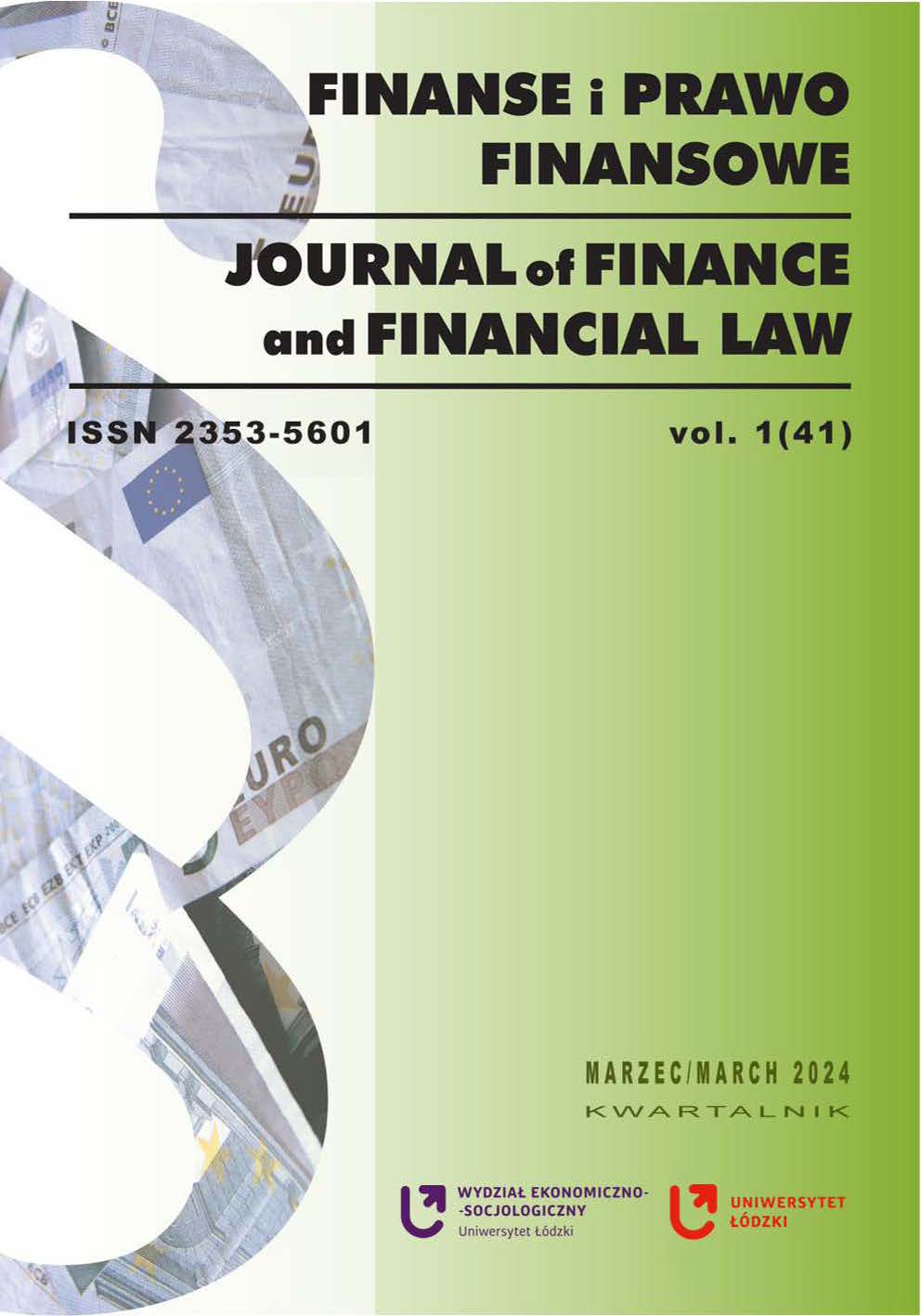Indirect Taxation: Assessing the Impact of the Sugar Tax in Poland
DOI:
https://doi.org/10.18778/2391-6478.1.41.05Keywords:
sugar tax, fiscal and non-fiscal function, indirect taxAbstract
The purpose of the article. In 2019, Poland introduced a sugar tax that encompassed food products, including beverages. Since the sugar tax is a form of indirect taxation, consumers bear its burden in the price of the purchased product. In response, businesses often adjust prices or reduce product quantities to offset their costs. This article aims to characterize the fiscal and non-fiscal significance of the sugar tax and to illustrate its impact on the financial situation of a selected soft drink industry enterprise.
Methodology. The applied research methods include a literature review analysis, analysis of legal acts and financial data analysis.
Results of the research. The impact of the sugar tax on a company can be diverse and dependent on various factors. Its fiscal and non-fiscal nature means that, on the one hand, the goal is to reduce the consumption of "harmful products" to improve public health by reducing sugar intake and addressing health problems related to excessive consumption of sugary beverages. On the other hand, it aims to generate additional revenue for the state budget. It also has implications for the financial situation of the company.The results of the analysis indicate that the sugar tax, due to its pass-through nature, remains neutral for businesses, without adversely affecting revenue, profitability or financial liquidity.
Downloads
References
Act of February 14, 2020, amending certain laws in connection with the promotion of health-conscious consumer choices (Ustawa z dnia 14 lutego 2020 r. o zmianie niektórych ustaw w związku z promocją prozdrowotnych wyborów konsumentów, Dz.U. 2020, poz. 1492).
Google Scholar
Act of September 11, 2015, the Public Health (Ustawa z dnia 11 września 2015 r. o zdrowiu publicznym, Dz.U. 2020, poz. 322, 1492).
Google Scholar
Adamiec, D. (2020). Podatek od cukru jako narzędzie zmiany nawyków żywieniowych. INFOS Zagadnienia społeczno-gospodarcze, 3(269), pp. 1–4.
Google Scholar
Budna, M. (2019). Fiskalne i pozafiskalne konsekwencje wprowadzenia podatku od cukru w polskim systemie podatkowym. Debiuty Naukowe Studentów Wyższej Szkoły Bankowej, 19, pp. 13–32.
Google Scholar
Dahms, A. (2021). Opłata cukrowa – słodko nie będzie. Przegląd Podatkowy, 1, pp. 3–8.
Google Scholar
Faraudello, A. and Costelli, F. (2022). The sugar tax implementation. Journal of Modern Accounting and Auditing, 18(4), pp.165–180.
Google Scholar
DOI: https://doi.org/10.17265/1548-6583/2022.04.002
Felis, P. (2006). Wpływ podatku od towarów i usług na sytuację finansową małych i średnich przedsiębiorstw. Warszawa: Szkoła Główna Handlowa w Warszawie.
Google Scholar
Fernandez, M.A. and Raine, K.D. (2019). Insights on the Influence of Sugar Taxes on Obesity Prevention Efforts. Current nutrition reports, 8, pp. 333–339.
Google Scholar
DOI: https://doi.org/10.1007/s13668-019-00282-4
Frisvold, D.E., Fletcher, J.M. and Tefft, N. (2010). The effects of soft drink taxes on child and adolescent consumption and weight outcomes. Journal of Public Economics, 94(11–12), pp. 967–974.
Google Scholar
DOI: https://doi.org/10.1016/j.jpubeco.2010.09.005
Goncalves, J., Merenda, R. and dos Santos, J.P. (2022). Not so sweet: The impact of the Portuguese soda tax on producers. Ruhr Economic Papers, No. 938. Essen: RWI – Leibniz Institute for Economic Research.
Google Scholar
DOI: https://doi.org/10.2139/ssrn.4368842
Kluzek, M. (2014). Rozwiązania podatkowe a płynność finansowa przedsiębiorstw. Studia Ekonomiczne / Uniwersytet Ekonomiczny w Katowicach, 198, cz. 1, pp. 267–275.
Google Scholar
Majchrzycka-Guzowska, A. (2021). Wybrane problemy polityki fiskalnej w okresie pandemii. In: K. Iglicka-Okólska, M. Dobrzyński, red., Administracyjno-finansowe konteksty zarządzania – wybrane zagadnienia. Warszawa: Sekcja Wydawnicza Wydziału Zarządzania Uniwersytetu Warszawskiego, pp. 7–38.
Google Scholar
Małecka-Ziembińska, E. (2022). Podatki w ujęciu retrospektywnym i perspektywicznym. Poznań: Uniwersytet Ekonomiczny w Poznaniu.
Google Scholar
DOI: https://doi.org/10.18559/978-83-8211-116-3
Obrzeżgiewicz, D. (2016). Wpływ podatku od towarów i usług na płynność finansową przedsiębiorstwa. Prace naukowe Uniwersytetu Ekonomicznego we Wrocławiu, 439, pp. 253–264.
Google Scholar
DOI: https://doi.org/10.15611/pn.2016.439.22
Véliz, C., Maslen, H., Essman, M., Taillie, L.S. and Savulescu, J. (2019). Sugar, taxes and choice. Raport Centrum Hastings, 49(6), pp. 22–31.
Google Scholar
DOI: https://doi.org/10.1002/hast.1067
Zeng, Z. (2019). The impact of a sugar tax on the economy. The Frontiers of Society, Science and Technology, 1(5), pp. 39–41.
Google Scholar
(www.1) Taxes on sugary drinks: Why do it? WHO, 2017, nr WHO/NMH/PND/16.5 Rev. 1, https://apps.who.int/iris/bitstream/handle/10665/260253/WHO-NMH-PND-16.5Rev.1-eng.pdf?sequence=1&isAllowed=y [Accessed 21.10.2022].
Google Scholar
(www.2) https://www.gov.uk/government/news/soft-drinks-industry-levy-comes-into-effect [Accessed 14.08.2023].
Google Scholar
(www.3) https://www.portalspozywczy.pl/mleko/wiadomosci/estonia-podatek-od-slodkich-napojow-obejmie-takze-nabial,146020.html [Accessed 14.08.2023]
Google Scholar
(www.4) https://businessinsider.com.pl/twoje-pieniadze/prawo-i-podatki/podatek-cukrowy-mamy-3-najwyzszy-w-europie-sprawdzamy-jakie-daje-efekty/ytxw59r [Accessed 20.05.2022]
Google Scholar
(www.5) http://gazetacodzienna.pl/artykul/gospodarka/slodko-nie-bedzie-gorzka-prawda-o-podatku-cukrowym [Accessed 26.10.2022]
Google Scholar
(www.6) Sugary drink taxes around the world, Updated, Global Food Research Program UNC, 2020, https://www.google.com/url?sa=t&rct=j&q=&esrc=s&source=web&cd=&cad=rja&uact=8&ved=2ahUKEwiFsOi40_iE-AxVKR_EDHT22COkQFnoECBQQAQ&url=https%3A%2F%2Fglobalfoodresearchprogram.org%2Fwp-con-tent%2Fuploads%2F2020%2F08%2FSugaryDrink_tax_maps_2020_Au-gust_REV.pdf&usg=AOvVaw3T0AhQpmTlX1ptgDkrTLEN&opi=89978449 [Accessed 21.10.2022].
Google Scholar
Downloads
Published
How to Cite
Issue
Section
License

This work is licensed under a Creative Commons Attribution-NonCommercial-NoDerivatives 4.0 International License.














